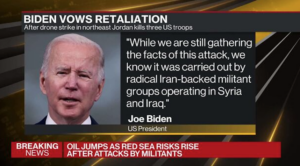The drone attack that killed three U.S. soldiers in Jordan, carried out by militant groups backed by Iran, has intensified the already volatile Middle East situation. President Biden is under increasing pressure to send a strong message to Tehran.
The White House is now faced with the difficult task of responding to Iran to deter future attacks, but without triggering an even wider conflict – something that the Biden administration was adamantly opposed to since the beginning of the Israel/Hamas War.
The attack in Jordan was the first time U.S. military personnel have been killed since the Gaza war began in October. This added a new level of complexity to the White House.
“We don’t want another war.” We do not seek to escalate. We will do everything we can to protect ourselves and respond to these attacks”, John Kirby, national security spokesperson told reporters on Monday.

Biden has promised to respond to recent attacks at a time and in a manner “of our choosing”.
The President met with his National Security Team on Monday, including Jake Sullivan, the national security adviser, and Lloyd Austin, the Defense Secretary, who was returning to the Pentagon after undergoing prostate cancer surgery.
Kirby stressed that the U.S. does not want a war against Iran. However, when asked whether Biden was considering a strike within the country, Kirby would not confirm if it was on his mind.
This weekend’s attack was escalatory and was no mistake. “It requires a reaction, there is no doubt about it,” he said, “I won’t get in front of the president’s decision-making.”
Since late October, American troops have been targeted by groups backed by Iran more than 160 different times.
In recent weeks, the White House launched precision strikes against Iranian-backed militias and retaliated against the Houthis after they attacked commercial shipping in Yemen.
The death of U.S. soldiers will raise the stakes, especially among Republican defense hawks who have already called for retaliation including in Iran.
Ali Vaez is the director of the Iran Project at the International Crisis Group. He said that if the U.S. wanted to hold Iran accountable, they could target sites or infrastructure in Iraq or Syria, which are used by the Iranian military’s wing, the Islamic Revolutionary Guard Corps.
He added that the U.S. would likely not target Iranian soil.

Vaez stated that “the Biden administration faces a dilemma in how to make Iran’s nose bloody, as this attack calls for and serves, without touching Iran’s face.” “They do not want to be forced to attack Iran on its territory.” It’s very hard to thread that needle.
The deaths in Washington sparked outrage and some Republicans called for a stronger response from Iran, which sponsors the militia groups.
Former President Trump, Biden’s likely GOP opponent in the November general election, blamed Biden’s “weakness”, and claimed that the U.S. is “on the verge of “World War 3.”
Republican lawmakers also piled on. They criticized the White House, accusing it of failing to hold Iran responsible, and called for Biden to respond swiftly and decisively.
Rep. Mike Rogers, R-Ala., chair of the House Armed Services Committee said in a press release that “real leadership requires real actions.” “Attacks against our servicemembers and allies will continue until the president demonstrates strong leadership and inspires fear among our enemies.”
Iran denies involvement in the Jordanian attack. It claims that it does not give direct orders to militias. The U.S. claims that Iran is complicit in attacks carried out by its proxies.
Sabrina Singh, Pentagon’s deputy press secretary, said that the attack had the “footprints of an Iranian-backed Iraqi group, Kata’ib Hezbollah,” but did not make a definitive determination. She stated that the U.S. held Iran responsible for this attack, but did not answer the question of how Tehran will be held accountable.
The Iranian-backed groups will most likely respond to any U.S. reaction against Iran with more retaliation in a continual cycle until the Israeli conflict in Gaza is over. The Iranian-linked group claims to be fighting against American soldiers in solidarity with Palestinians.
Barbara Slavin is a distinguished fellow and Middle East expert at the Stimson Centre. She said that the Jordan attacks were a “dangerous escalation” and predicted an aggressive response by the U.S. against whoever was responsible.

She said that the U.S. had already killed an Iranian-backed leader who was in Iraq this month, and conducted several destructive strikes. None of these have deterred further attacks.
She said, “I don’t know what else the U.S. could do to deter these attacks.” “The only thing that will deter these strikes is a Gaza cease-fire since all of these groups claim to be acting in solidarity with Palestinians.”
Singh stated that the Pentagon has no plans to change its strategy against Iranian-backed terrorists, even though the deterrence method is not working to stop the attacks.
Singh told reporters, “We will respond at the time and location of our choice.”
The fighting could become more deadly for American soldiers, as Iran is expected to respond to any U.S. attack. Most of the American troops have suffered minor or traumatic injuries.
One attack in Iraq on Christmas Day severely injured an American soldier.
A drone that crashed into a base of the United States in Erbil, Iraq in late October did not explode. The U.S. would likely have been killed if the drone had exploded.
Slavin stated that the sheer number of attacks by Iranian-backed militias on the U.S. indicated a deadly strike was only a question of time.
She said, “This tragedy was one that looks inevitable in retrospect.” “Whenever you engage in this type of activity, there is a risk that someone will be killed.”










